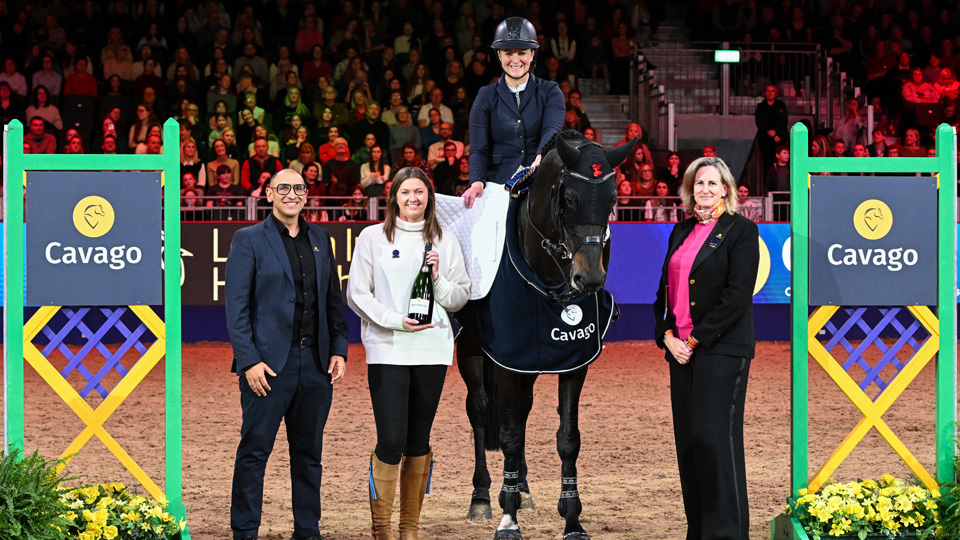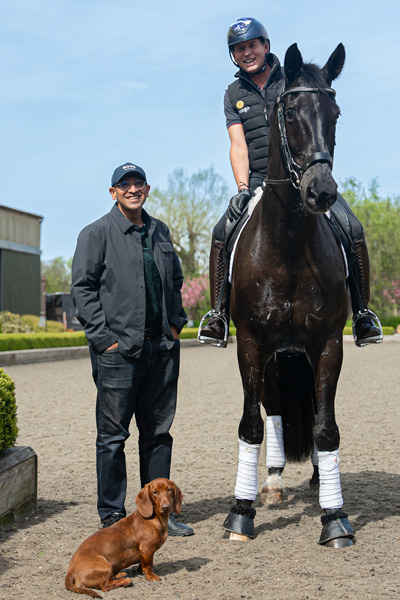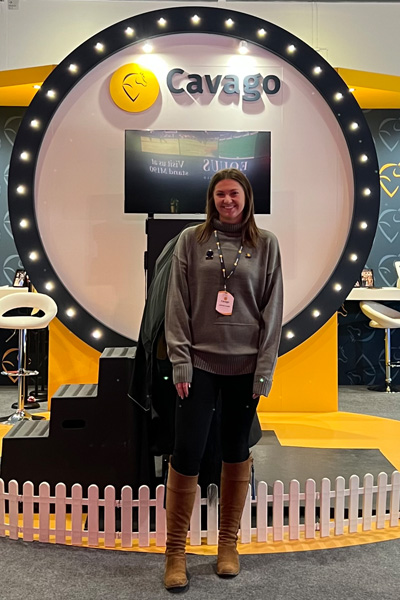Cavago, an online platform dedicated to supporting the global equine industry, is enabling the transition to a digitally connected future. At the reins are two Loughborough graduates, Tauseef Qadri, Founder and CEO, and Sophie Clark, Managing Director - UK and Europe. Passionate equestrian enthusiasts, they share a vision for reshaping how people around the world experience interacting with horses.
In an extensive interview, Tauseef and Sophie shared their experiences of studying at Loughborough University, the challenges of starting a business, and the motivation behind their push for technological integration in the equine industry.
What influenced you to study at Loughborough University?
Tauseef Qadri: “I was a cricketer, part of the cricket academy at Loughborough, and I was looking for a course that would complement that time commitment effectively. I had always been interested in a business focused degree; my dad studied a master’s in public administration and managed military hospitals in Saudi Arabia. Listening to him discuss his work developed my interest in how organisations function.
“Management Sciences struck a balance; it gave me room to explore my interest in business theory whilst still having time outside of classes to pursue my cricketing goals. That combination of sport and business gave me my first idea for a start-up.
“During my studies, I had the opportunity to examine the techniques of Six Sigma. That exploration led to my idea of applying those principles to measure how batsmen strike cricket balls, helping them analyse and improve their game. Ultimately I didn’t end up pursuing that idea for a business, but it gave me the opportunity to consider the many aspects of starting a new enterprise.”
Sophie Clark: “I chose to study Geography and Sports Management at Loughborough. I wasn’t sure about university initially, but as soon as I visited the campus, I felt immediately that it was the place for me. Even so, I had never been away from home for that long, and the first few weeks were tough.
“Horses have always been a huge part of my life, so I decided to join the Equestrian Society and quickly made plenty of friends. Some of the older students took me under their wing and from then on I really felt I’d made the right choice in coming to Loughborough.
“My initial experience of university taught me a lot about resilience, but also the importance of being open to new experiences and making an effort to connect with people.”
What did you do after graduating from Loughborough?
Tauseef: “I was fortunate enough to have a really varied career after finishing my degree, I’ve worked in London, Dubai and Singapore, for both start-ups and Fortune 250 businesses. My first job was in pricing management with Xerox, which was a leading company in the technology space at the time. I also had the chance to further my education with a MSc in Sustainable Development from SOAS University of London.
“Having grown up in the Middle East, I was familiar with the region. I could see that Dubai was on the rise, so I decided to relocate there. I worked for an investment firm, where I met an American entrepreneur who was involved in advising high-level individuals about investing in horse breeding. She had a mandate to build a huge real-estate project based around this equestrian programme, focused on bringing back the breeding of Arabian horses to the region. As a life-long lover of horses, it was an ideal opportunity for me, so I joined the operation and led on the development of the real-estate projects involved.
“I lost my role with the company after the 2008 financial crisis, so I decided to take that opportunity to explore my passion for technology and study a postgraduate qualification in the use of Artificial Intelligence (AI) at the Massachusetts Institute of Technology (MIT). Understanding how to use data and AI is a business imperative, data processing capabilities and decision making are essential tools for forward thinking organisations. That critical need is why I was particularly excited to see that Loughborough is now involved in the MIT Global SCALE Network and has established the new UK SCALE Centre.
“Returning to the business world, I decided to approach one of my old lecturers at Loughborough Business School, Dr Cheryl Travers. Building on her work in Reflective Goal Setting, I developed a programme based on analysing emotional intelligence feedback from horses. This business enabled senior corporate leaders to spend time engaging with the animals and gain transferrable insights on emotional control, empathy and management practice.
Sophie: “My degree was fantastic for opening up career options, but I was still trying to work out what to do after graduating. By chance, I saw a job advert from an equestrian-related company called Keysoe International on Facebook for an events executive. They saw my background with horses, along with my student leadership of the Equestrian Society, and decided to offer me the role.
“I worked for Keysoe for about 18 months, before new ownership decided to orient the business as a private focused horse training centre and reduce the events programme. I then moved over to more of a Marketing and Communications role, working to secure sponsorships with major companies like Jaguar Land Rover. Eventually the business decided to move away from events entirely and I chose to look for something new. I put out feelers to my network that I was looking for a role in the equine industry and was introduced to Tauseef through a mutual contact.”
What inspired you to set up Cavago and how has the business grown?
Tauseef: “There are over 60 million horses globally. In the U.S. alone, there are 10 million horses, and 30 million households have someone interested in horses. According to an American Horse Council study the industry has a $177 billion economic impact, more than the motion picture industry. In the UK we spend over £1.1 billion in stabling horses and more than £700 million on training, riding and feeding animals. Yet, almost across the board, horse businesses are not digitally enabled and lack even a basic website, let alone an app.”
“Cavago seeks to make life easier for both businesses and consumers by creating a digital marketplace for equestrian experiences, ranging from stabling and training to international riding holidays and safaris. We’re growing fast and we now have over 1,000 UK business partners and nearly 250 listings live on the app.”
“Our aim is to be the Booking.com or Airbnb of the horse world, by filling the enormous information gap between users and providers of horse-related services. We want to empower equine businesses with tools they’ve never had access to before.”
Sophie: “We’ve both experienced the unique magic of connecting with a horse. My own horse, Albie, is a real source of grounding and comfort for me in my busy day-to-day life. Caring for him helps to keep things in perspective, it’s a two-way street between us. We want to make the opportunity to bond with these animals more accessible to anyone with an interest in doing so.”
Tauseef: “There’s a romanticism to equestrianism; horses have been our constant companions across the world for centuries. However, there’s also a real economic engine in the equine industry that has gone underutilised for a long time now. By digitally integrating these businesses, we’re not just making bookings easier, we’re preserving and promoting a treasured global heritage.”


